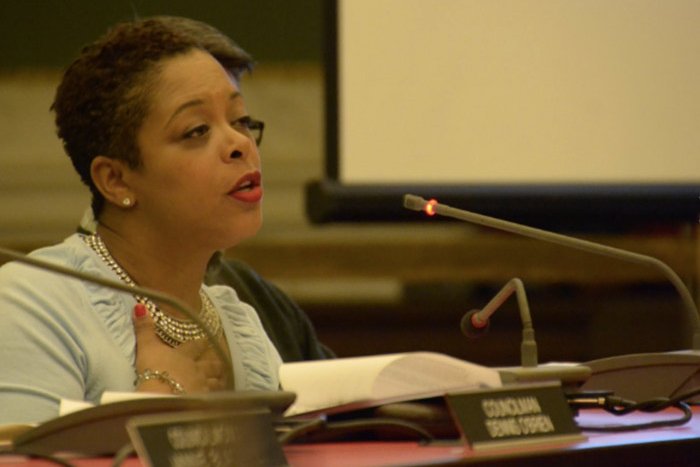
December 14, 2017
 Source/Philadelphia City Council
Source/Philadelphia City Council
"The last thing I want are a bunch of empty storefronts, but they need to change their business model," says Philadelphia City Councilwoman Cindy Bass. "These are businesses pushing addictive behavior – whether that’s drugs or alcohol – and we have to call that out.”
After a heated hours-long hearing on Thursday, Philadelphia’s City Council voted overwhelmingly to approve a controversial “stop and go” bulletproof-glass bill which will now go to the desk of Mayor Jim Kenney, who is expected to sign it into law.
Those who voted against Councilwoman Cindy Bass’s proposal – inspired by a desire to crackdown on nuisance “beer delis” that she said perpetuated addictive behaviors in the city’s roughest neighborhoods – were Councilmen Allan Domb, David Oh and Mark Squilla.
The vote, taken just before 3 p.m., came after hours of comments from members of both the public and council body in a packed Council Chambers.
Those who lined up in opposition were shopkeepers and residents who told stories of tragic fatalities that bulletproof glass would have prevented.
Those who spoke up in favor during public comment decried such establishments as being predatory insofar as they push addictive products ranging from alcohol to drug paraphernalia in violation of the city code. They called for greater accountability and respectability from the business owners.
Bass, who represents the 8th Councilmanic District, had been the target of much criticism when shopkeepers – primarily Asian Americans – pushed back against the measure that she said came after years of research.
"You can’t get a pastrami on rye at any of these places.” – Councilwoman Cindy Bass
She said that much disinformation had been spread to undercut her argument and rallied against “unacceptable business practices that have been going on for far too long.”
“Owners of ‘stop and gos’ are now calling themselves ‘beer delis,’ which is laughable,” she said. “You can’t get a pastrami on rye at any of these places.”
What you can get, she said, are beer, shots, “cold medicine that can be converted” into drugs, crack pipes and fruit-flavored cigarillos in neighborhoods where “self-medication happens frequently.”
She likened stop and go's to “indoor open-air drug markets masquerading as restaurants.”
“How can anybody defend this?” she asked. “If they were selling hypodermic needles to heroin users, there would be an immediate call to shut them down. Let’s just admit it: It’s a different kind of addict so it’s a different kind of response.
“I’ve never heard so many people defending the continuance of addiction under the guise of ‘safety first.’ You’ve been had.”
She also chided the Asian American Licensed Beverage Association of Philadelphia for not living up to the terms of an agreement from December 2004 in which they agreed to hire security guards for protection, and to stop selling drug paraphernalia, at such establishments in high-crime areas.
“How much of this have you done? Some of it? Any of it?” she asked, noting that such businesses have “blood on your hands” for enabling the cycle of addiction. “I think I have the answer: None of it, because you found out you didn’t legally have to.”
After Bass concluded that an aye vote would help Philadelphia “say goodbye to breakfast booze spots,” several of her peers voiced support for the bill.
Oh was not one of them, saying that he felt “very sorry” that Bass faced personal attacks but stood by his opposition to the bill.
“They put their faith in the safety glass. I think it’s a dangerous thing to have a frightened person with a firearm.” – Councilman David Oh
He based that on the idea that such businesses licensed as restaurants with 30 or more seats would have to remove their protective Plexiglass barriers.
That’s what could happen if – thanks to a compromise made in the legislative process – inspectors with the city’s Department of Licenses and Inspections find them in violation before January 1, 2021.
Should the bill become law, L&I would have three years to iron out a process that would "provide for the use or removal" of barriers at these sorts of businesses.
“If we take down the safety glass, they’re not changing their business model or moving. What they’ll do is purchase firearms, and that’s a worse situation than what we have today,” Oh said. “The reason they’re here today is they’re concerned for their lives, the loved ones, their customers and their stores.
“They put their faith in the safety glass. I think it’s a dangerous thing to have a frightened person with a firearm.”
Oh also noted that he didn’t see the recent legislative changes as a compromise so much as wording changes that didn’t alter the spirit of the bill.
Gov. Tom Wolf signed legislation last month that cracks down on these stores, giving the Pennsylvania Liquor Control Board more leeway in inspecting and shutting down stores with violations.
Bass said the council bill will, when signed into law, bring Philadelphia into compliance with state law.